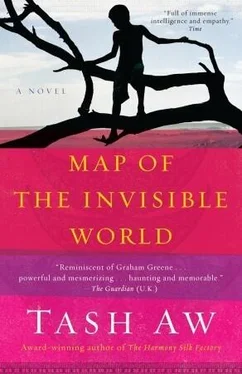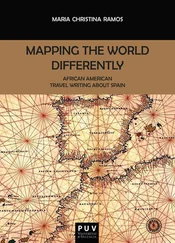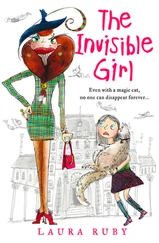Tash Aw - Map of the Invisible World
Здесь есть возможность читать онлайн «Tash Aw - Map of the Invisible World» — ознакомительный отрывок электронной книги совершенно бесплатно, а после прочтения отрывка купить полную версию. В некоторых случаях можно слушать аудио, скачать через торрент в формате fb2 и присутствует краткое содержание. Год выпуска: 2010, Издательство: Spiegel & Grau, Жанр: Современная проза, на английском языке. Описание произведения, (предисловие) а так же отзывы посетителей доступны на портале библиотеки ЛибКат.
- Название:Map of the Invisible World
- Автор:
- Издательство:Spiegel & Grau
- Жанр:
- Год:2010
- ISBN:нет данных
- Рейтинг книги:4 / 5. Голосов: 1
-
Избранное:Добавить в избранное
- Отзывы:
-
Ваша оценка:
- 80
- 1
- 2
- 3
- 4
- 5
Map of the Invisible World: краткое содержание, описание и аннотация
Предлагаем к чтению аннотацию, описание, краткое содержание или предисловие (зависит от того, что написал сам автор книги «Map of the Invisible World»). Если вы не нашли необходимую информацию о книге — напишите в комментариях, мы постараемся отыскать её.
comes an enthralling novel that evokes an exotic yet turbulent place and time—1960s Indonesia during President Sukarno’s drive to purge the country of its colonial past. A page-turning story,
follows the journeys of two brothers and an American woman who are indelibly marked by the past — and swept up in the tides of history.
Map of the Invisible World — читать онлайн ознакомительный отрывок
Ниже представлен текст книги, разбитый по страницам. Система сохранения места последней прочитанной страницы, позволяет с удобством читать онлайн бесплатно книгу «Map of the Invisible World», без необходимости каждый раз заново искать на чём Вы остановились. Поставьте закладку, и сможете в любой момент перейти на страницу, на которой закончили чтение.
Интервал:
Закладка:
As if guilty by association, Karl’s music soon began to annoy Adam too. It made no difference what it was: The moment Karl moved toward the record player, Adam’s back would stiffen. Violins that had previously thrilled him now sounded harsh and screeching; operatic voices, amusing before, were suddenly ridiculous. Adam took to leaving the house altogether. Heading for the sea, he would clamber over the rocks and make his way as far up the shoreline as possible until even the faintest strains of Karl’s dying heroines were drowned out by the hush of the waves. One or two outrigger canoes would be floating on the steel blue sea, their sails trembling gently in the breeze; small nets would be flung from the boats, the fishermen hauling in meager catches of mackerel and skipjack and anchovies. Adam would sit watching until his head felt clear and calm once more, the anger draining from his body.
“What’s wrong with you? Why are you so angry?” Karl called out after him the first time he got up and left the room, mid-aria, and ran down to the sea. Until this moment, facing this thing that filled his head — anger beginning his New Life with Karl — Adam had never truly known what it was to feel angry. He wondered whether this anger meant that he was somehow changing, and if so, how. He would lie awake in bed thinking, Why am I angry? and, finding no answer, would become angrier still.
At school he suddenly became conscious of what he was: an orphan. He had never been aware of this status, for many of his classmates seemed to be orphans too. Every so often someone would drop out of school to work in the rice fields or help with the nets, and Adam would learn that their father had drowned at sea or their mother had died in childbirth; now they were an orphan. On this island it seemed entirely normal to have lost at least one parent. But one day they had a new teacher, a young Sasak who had studied at the Universiteit van Indonesië. He taught them the difference between orphans who had lost one parent and those who had lost both. There was a word that distinguished the two: piatu . It was important to be precise with our Indonesian language, the teacher said; we have to use it carefully and with pride. This revelation troubled Adam greatly. Had he been orphaned once or twice? Was he a true orphan, more pitiful than the others? He went home and consulted Karl’s dictionary, kept on the highest, dustiest shelves like some forgotten, forbidden relic. Perhaps he would be less of an orphan in Dutch. He would discover that in every language but his own he would be an ordinary, unremarkable orphan. He remembered the Dutch word for orphan and found it quickly, but the definition was full of words he did not understand and left him more frustrated than ever.
One evening, just before dinner, Karl put on some music — a Keroncong song’s repetitive stringy notes. They sat down to their meal: overcooked mutton curry and rice.
“Not hungry, Son?”
Adam did not answer; he did not even bother to shake his head. With his spoon he built mounds of rice on his plate and then mashed them into the shallow pool of curry before rebuilding and remashing them. The edge of his plate was decorated with faded purple flowers whose stems disappeared into the brown swamp that Adam had created.
“Adam,” Karl said, “please don’t play with your food. A lot of people on this island are surviving on one meal every three days, and I mean one meal of rice mixed with tapioca.”
Adam dabbed at the curry. He found a morsel of meat and tried to cut it using the side of his spoon, but the mutton was tough, full of tendons.
“Use a knife, Adam, you’re making a mess.”
Adam went to the kitchen and returned with a blunt butter knife. He began to saw at the piece of mutton listlessly, as if he had already given up.
“Please,” Karl said, “don’t hold your knife like that. Put it between your thumb and forefinger — you’re not holding a pencil.”
Adam looked straight ahead, avoiding Karl’s gaze and glaring instead at the piano. Then he smacked the knife down on the table, catching the side of his plate and upending a thick glob of curry onto the tablecloth. He felt his eyes well up with hot tears, his head prickling with that burning sensation that he now knew to be anger; and this time the anger seeped downward too, filling his chest and belly.
“Don’t you leave the table, Adam,” Karl said, his voice still calm. “You’re going to stay here and finish the meal that you are lucky to have. If there is something you are not happy about, say it — but don’t you dare leave food on the table.”
Adam had already risen, his chair pushed back, his hands clutching the side of the table. He remained in this state of limbo for some time, making no attempt to wipe away the thick streams of tears flowing down his cheeks.
“I want to know,” he said at last. “I want to know about my family.”
Karl sighed. He placed his fork gently on the edge of his plate and then leaned forward, resting his elbows on the table. He held up his hands and looked at his palms, intently, as if trying to decipher the secrets of his own life. He lowered his face into his hands and sighed again. “I found you at the orphanage, that’s all. You know the whole story. There’s nothing more to tell.”
Adam looked away from Karl. “Everyone has a history, you told me that yourself. I want to know about my life — my real life.”
“But this,” Karl said, gesturing weakly with both hands at the space around him, “ this is your life. Isn’t this enough?”
There was no breeze that evening. The rose-colored lace curtains over the always-open windows did not stir. Adam stared at their pattern of chrysanthemums and palm leaves. The room suddenly felt airless and utterly still.
“Your mother was not local.” Karl spoke in a measured monotone, as if he had rehearsed saying these words a thousand times before. “Some people said they had seen a fair-skinned woman in the village the day before you were found. She had the complexion of a Sumatran or a Malay and she spoke differently, with a big-city accent — Jakarta, some people thought, but no one was sure; it was difficult to understand what she was saying. Someone asked her where she had come from and she said, ‘From a place far away.’ She asked directions to the orphanage. She had a baby. It was so silent and still that some people thought it was dead. There was a toddler too, a little boy with glassy eyes that never blinked. The villagers saw the woman walking along the paths leading out to the hills, along the rice fields that were very green that year. The next day she was gone and there were two new children at the orphanage. This is all I know.”
Adam noticed that he had, quite suddenly, become curiously clearheaded and calm. His breathing had slowed considerably. He wondered why he could not react more powerfully to what he had just heard — it did not seem like a revelation but a mere affirmation of something he already knew; it confused him that he should feel soothed, not agitated, by this news.
“So she went back to Jakarta,” he said eventually.
“I haven’t a clue. She could just as well have been from Surabaya or Medan or even Singapore. This is what they told me when I went to the orphanage. They mentioned nothing else — no father, nothing.” Karl reached across and laid his hand on Adam’s arm; Adam felt it on his skin, cold and clammy and heavy. “Son, please believe me, that is all I know.”
“What about,” Adam said, hesitating, “what about my brother?”
“They say he was taken somewhere far away — Kuala Lumpur, they thought. The people who adopted him did not want to say where they were taking him.”
Читать дальшеИнтервал:
Закладка:
Похожие книги на «Map of the Invisible World»
Представляем Вашему вниманию похожие книги на «Map of the Invisible World» списком для выбора. Мы отобрали схожую по названию и смыслу литературу в надежде предоставить читателям больше вариантов отыскать новые, интересные, ещё непрочитанные произведения.
Обсуждение, отзывы о книге «Map of the Invisible World» и просто собственные мнения читателей. Оставьте ваши комментарии, напишите, что Вы думаете о произведении, его смысле или главных героях. Укажите что конкретно понравилось, а что нет, и почему Вы так считаете.












